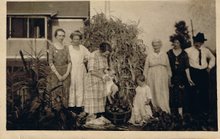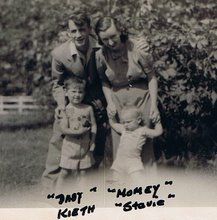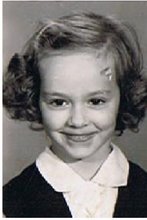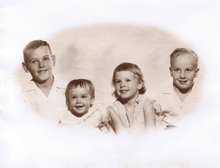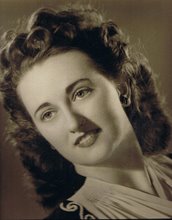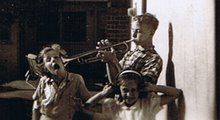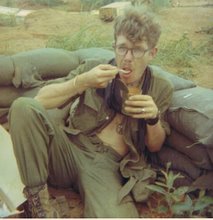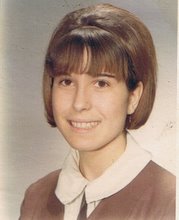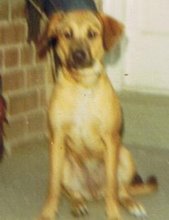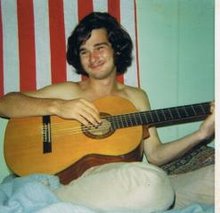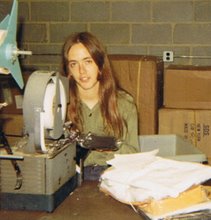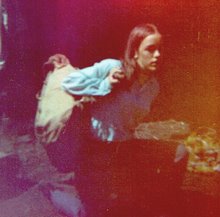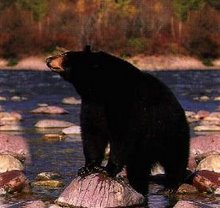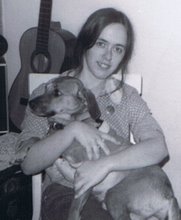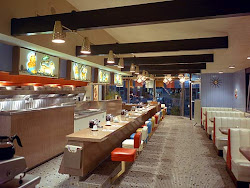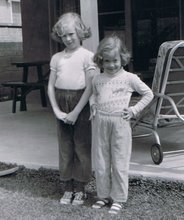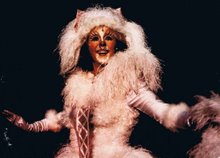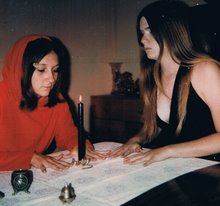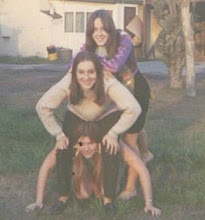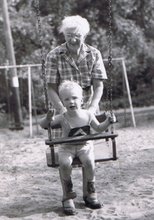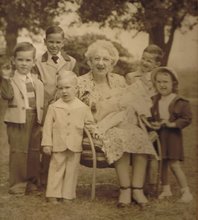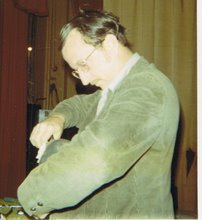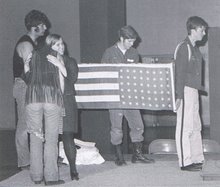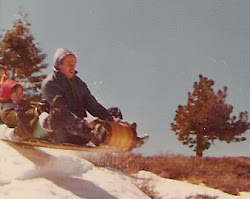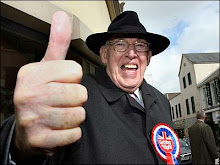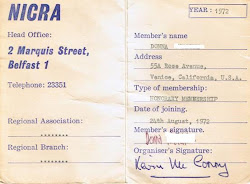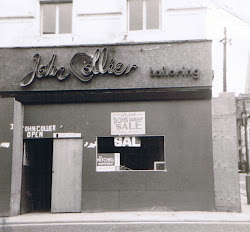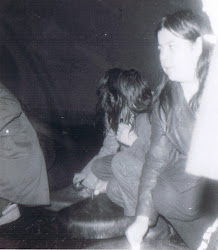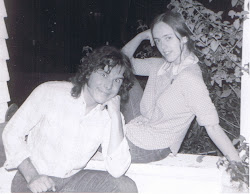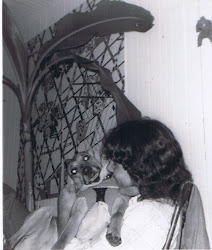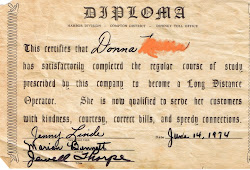18 June 2007
A lot of my brother’s friends had nicknames: Bear, Gypsy, Dirty Dave, Squirrel. This wasn’t surprising since Bear’s real name was Saferino and Gypsy’s was Kevin; and these were hardly suitable monikers for guys who claimed to be bikers. Bear was a former member of the Cossacks motorcycle gang, despite the fact that he didn’t have a motorcycle all the time that I knew him; and his best friend Gypsy rode a Honda 50. Nevertheless, they wore biker “colours”, Levis jackets with the sleeves ripped off over leather motorcycle jackets.
Though my brother (whose nickname was, occasionally, Stephen LeFreak) was adamant that he didn’t want us to on any account have anything to do with his friends (because he knew them better than we did!), my friends Cathie, Carol and I (who collectively called ourselves the Mini-Skirt Mob) were fascinated.
Bear was from the barrio and had grown disenchanted with changes in gang culture.
“In the old days,” said the eighteen year old, “If someone wanted a fight you put up your fists. Nowadays, you put up your fists, they take out a gun and shoot you.”
The hippie thing had taken hold and he found peace and love ultimately more attractive. And safer. Bear loved my brother like, well…like a brother, and was very protective of him. Peace and love aside, I think anyone messing with my brother would have regretted it.
Gypsy, despite his macho posturing, weighed about 110 pounds. Dirty Dave was a nice boy from a Mormon family who was thrown out by his father for his teenage rebellion. Squirrel was a quiet soul with a timid rodent-like face (he was lucky to be nicknamed Squirrel and not Ratface, I suppose). Crosland (no nickname! How did that happen?) had a old van which he turned into a mobile pad for him and his girlfriend Christa and, though he didn’t qualify as a wild boy, was the gang’s Jester. Rick was one of the sweetest guys I ever met. And Larry, who spoke some sort of pig Latin fluently enough so that no one except his closest friends could understand him, worked on his car longer than was healthy, and explained to his girlfriend, when she asked, that he had to fix the Tripod Pernundal and the Reverse Gonad before he could take her to the drive-in movie.
From the time I was a gawky, awkward prepubescent would-be teenybopper, however; when the last thing I was interested in was politics, something slowly and stealthily was happening that would scar my whole generation: Vietnam.
I don’t know when I was first aware that the United States was involved in a “police action” there. But, as more and more troops were sent and the conflict escalated, it took political center stage. By 1964 there was a full-scale war going on there, but the first stirrings of the embryonic anti-war movement, led by Mario Savio at UC Berkeley, were condemned as the sedition of communists and communist dupes, giving comfort to the enemy.
It wasn’t at all like the war in Iraq, of course. In Vietnam, the US got involved because it wanted to spread democracy to Southeast Asia and counter a threat from a bloc of hostile states in order to secure the interests of the United States and freedom for the Vietnamese people which it hoped to achieve quickly but, unfortunately, resulted in a protracted war with local insurgents that was never defeated. So, as you can see, nothing like Iraq.
Eventually the draft was introduced to supply the ever increasing number of soldiers they told us were required to win the war in Vietnam. Suddenly the issue went beyond politics. And began to directly affect our lives.
My brother Keith joined the Air Force, wanting to get his service, which he thought was inevitable, out of the way. Steve got a 4-F deferment because of his asthma. Dirty Dave joined the Marines in a doomed attempt to win back the respect of his Mormon father. Bear, Squirrel and Rick got drafted. Gypsy, at the age eighteen, was charged with having sex with his fifteen-year-old girlfriend (technically statutory rape)and given a choice by the judge to go to jail or into the army. He went into the army.
Inexplicably, and in total defiance of my brother’s insistence that any of his friends should have more than a passing acquaintance with his sisters, I perversely became almost unbearably besotted and infatuated with Gypsy, the statutory rapist. (What was I thinking!?) To me he was James Dean! He was Marlon Brando! He was a skinny guy on a Honda 50 who wrote a poem about how I was his ideal woman. What sixteen year old couldn’t fall for that? I was a virgin and he got absolutely nowhere with me. I must have driven him crazy!
Just before he shipped out to Vietnam, he asked me to marry him. I said yes. Imagine that? I didn’t tell my mom or my brother though.
He wrote to me several times a week; articulate, even eloquent letters about the life he hoped to build with me. He was surprisingly tender for a statutory rapist, demonstrating an unexpected grasp of modern literature and expressing a desire to study to be an English teacher when he got home. And he ardently expressed his love for me on a regular basis. But, over time, his letters also betrayed a sense of a different sort of war than my father fought. There was cynicism. A lot of drugs. And reports of soldiers running amok and killing civilians. And their own officers. He sent me a peace symbol that I wore around my neck, and black and white photos of his time there. I still have them.
The Vietnam war ground on, despite assurances that we were winning and reports that the body counts of the Vietcong vastly exceeded those of our own troops (reports which, had they been true, would have meant we had killed every man, woman and child in Vietnam twice over). It seemed to me that every week our local paper, the Herald American, had a photo on its front page of another of our hometown boys who weren’t going to be coming home. And, at my high school, we were asked to pray for the soul of the brother of one of our classmates whose helicopter was shot down during the Tet Offensive of 1968.
My mother’s opposition to the war grew quietly, imperceptibly. She was busy raising her kids and working all the overtime she could get, often putting in twelve to fourteen hours days five days a week, plus Saturday and, occasionally Sunday. But events in her own house were about to cause her to have to make a stand.
It all started with Dirty Dave. He was a gentle, artistic soul who had been working as an apprentice carpenter and harboured dreams of one day studying to become an architect. His father seemed to think he was useless and effeminate and, in a desperate bid to win his approval, Dave had enlisted in the Marines. It was something he almost immediately regretted and, as the antiwar movement started to gather pace, Dirty Dave became convinced that the war in that far corner of Southeast Asia was immoral. He was in a terrible way when he came to stay with my brother during a short leave before he was due to ship out to Vietnam; and he agonised over what to do. The short leave turned into a very long leave, and then into absence without leave and then into desertion, which, in law, was a felony.
My mother noticed that he hadn’t left on the day he said he was going, or on the day after that or the day after that. After a while she knew what was going on. By allowing Dave to stay with us, she was aiding and abetting a felony but, faced with the choice of assisting his conscientious resistance or sending him back to fight that useless war, my mother, quietly and without any fanfare, chose to let him stay.
After awhile Bear, who had already travelled from gang culture to the peace and love of hippiedom, was convinced that the war in Vietnam was both immoral and racist. He wrote a passionately argued letter to his superiors making the case for his refusal to fight. And suddenly we had two war resisters sleeping on our sofas.
The antiwar movement was, by then, a vast network of activist organisations across the country, and we were able to make contact with the Unitarian Church in Whittier who were giving resisters sanctuary and helping them get to Canada. Commandeering my mother’s car, Dirty Dave and Bear I drove to the church with Dave at the wheel (I didn’t yet have a driver’s licence) to find out what could be done for them. The church agreed to help them both and we drove back, full of hope that the situation was going to be resolved very soon. But at an intersection on the way home a car turned left in front of us, Dave slammed on the brakes and a moment and a squeal later we hit the other car.
Dave got out and made sure no one was hurt. The woman in the car went to a payphone to call the police and Bear disappeared quietly into a crowd of passers-by. I looked up and saw that Dirty Dave was as white as a sheet in a laundry detergent commercial.
“Okay,” he said, “We’re going to wait till she’s in the phone booth and then we’re going to get the hell out of here.”
In a flash we were racing down the road in a dented car and all I could think was that we had left the scene of an accident! Could we really get away with this? It turned out we couldn’t.
The woman had obviously taken down the licence plate number because it didn’t take more than an hour or two before my mother tapped at my bedroom door and said, “There are some policemen here who want to talk to you.”
When I came out to the alley behind my house where the dented car sat side by side with two police cars, I saw Dirty Dave in handcuffs being put into one of them. He spent ten days in the County Jail for leaving the scene and was then handed over to the Marines where he was court-martialed, put on probation and returned to his unit.
My mother was on the FBI radar now. Our phone made strange noises, leading us to believe, rightly, that it had been tapped. Two men in business suits sat outside our house in a construction worker’s truck. (They couldn’t at least disguise them in work clothes?) But, although her car insurance premiums went through the roof after that, she accepted the situation with grace. It had been the right thing to do and she would do it again.
By the time the war in Southeast Asia was over I was finishing college at UCLA. Although I was out there protesting with the rest of them over the invasion of Cambodia and the secret war, I couldn’t help notice that almost no one that I met there knew anyone personally who had served in Vietnam. What I didn’t know was that this was America’s supposedly non-existent class divide. There were those who were reasonably well off, the ones who got their college deferments and never got drafted in the first place. And then there were the rest; guys like my brother’s friends, who hung out in the graffittied alley behind our house, under the lighted sign that said Welcome to Bellflower, the Friendly City – which someone had thrown a rock through years before and that no one had bothered to repair.
Bear managed to evade military justice for nearly a year before he was arrested and sent to Leavenworth. Sweet, lovely Rick came back with a serious heroin addiction. My brother Keith had a breakdown and ended up in a psychiatric hospital at Travis Air Force Base. And Squirrel never came back at all.
Dirty Dave eventually absconded to Canada, married and had three children. he never became an architect. Years later, unbearably homesick, he returned to the United States with his family and turned himself into the local Marine base. They sent him away without bothering to even arrest him. No one wanted to know about the Vietnam war any more.
When Gypsy came back from the war I met him at the airport. During the year he had been in Vietnam he had grown as passionately pro-war as I had become anti-war. The relationship collapsed before we got to the parking lot. I later burned all his love letters, and the poem he’d written for me.
War scarred my generation in a different way than it scarred our parents’ generation. And we lost our innocence along the way. We went in as idealists, armed with certainties, ready to shape the future in our own image while making an extended party of our adolescence. We came out, in the words of Joni Mitchell, as “ageing children.”
The last time I saw Gypsy was the day I graduated from UCLA. My mother asked me to go and get the car washed (she never wanted anything important to happen in a dirty car). As I stood watching my mother’s car go through the revolving brushes of Flan’s Car Wash on Bellflower Boulevard, a familiar profile caught my eye. We greeted each other cordially and he introduced me to his kids and to his wife: the woman he'd been charged for having sex with years before, and who was now absolutely bursting with their next child. He hadn’t gone to college. He hadn’t become an English teacher.
But then again, I don’t suppose that he, or any of the others, was meant to.
If you would like to comment on this post, please click on the word "Comments" below.





